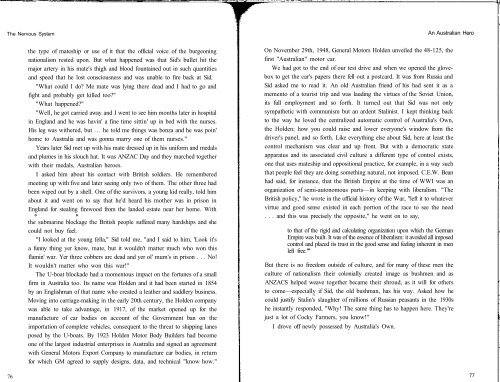The Nervous System - Department of English and Comparative ...
The Nervous System - Department of English and Comparative ...
The Nervous System - Department of English and Comparative ...
You also want an ePaper? Increase the reach of your titles
YUMPU automatically turns print PDFs into web optimized ePapers that Google loves.
<strong>The</strong> <strong>Nervous</strong> <strong>System</strong><br />
An Australian Hero<br />
76<br />
the type <strong>of</strong> mateship or use <strong>of</strong> it that the <strong>of</strong>ficial voice <strong>of</strong> the burgeoning<br />
nationalism rested upon. But what happened was that Sid's bullet hit the<br />
major artery in his mate's thigh <strong>and</strong> blood fountained out in such quantities<br />
<strong>and</strong> speed that he lost consciousness <strong>and</strong> was unable to fire back at Sid.<br />
"What could I do? Me mate was lying there dead <strong>and</strong> I had to go <strong>and</strong><br />
fight <strong>and</strong> probably get killed too?"<br />
"What happened?"<br />
"Well, he got carried away <strong>and</strong> I went to see him months later in hospital<br />
in Engl<strong>and</strong> <strong>and</strong> he was havin' a fine time sittin' up in bed with the nurses.<br />
His leg was withered, but ... he told me things was bonza <strong>and</strong> he was poin'<br />
home to Australia <strong>and</strong> was gonna marry one <strong>of</strong> them nurses."<br />
Years later Sid met up with his mate dressed up in his uniform <strong>and</strong> medals<br />
<strong>and</strong> plumes in his slouch hat. It was ANZAC Day <strong>and</strong> they marched together<br />
with their medals, Australian heroes.<br />
I asked him about his contact with British soldiers. He remembered<br />
meeting up with five <strong>and</strong> later seeing only two <strong>of</strong> them. <strong>The</strong> other three had<br />
been wiped out by a shell. One <strong>of</strong> the survivors, a young kid really, told him<br />
about it <strong>and</strong> went on to say that he'd heard his mother was in prison in<br />
Engl<strong>and</strong> for stealing firewood from the l<strong>and</strong>ed estate near her home. With<br />
o<br />
o<br />
the submarine blockage the British people suffered many hardships <strong>and</strong> she<br />
could not buy fuel.<br />
"I looked at the young fella," Sid told me, "<strong>and</strong> I said to him, 'Look it's<br />
a funny thing yer know, mate, but it wouldn't matter much who won this<br />
flamin' war. Yer three cobbers arc dead <strong>and</strong> yer ol' mum's in prison . . . No!<br />
It wouldn't matter who won this war!"<br />
<strong>The</strong> U-boat blockade had a momentous impact on the fortunes <strong>of</strong> a small<br />
firm in Australia too. Its name was Holden <strong>and</strong> it had been started in 1854<br />
by an <strong>English</strong>man <strong>of</strong> that name who created a leather <strong>and</strong> saddlery business.<br />
Moving into carriage-making in the early 20th century, the Holden company<br />
was able to take advantage, in 1917, <strong>of</strong> the market opened up for the<br />
manufacture <strong>of</strong> car bodies on account <strong>of</strong> the Government ban on the<br />
importation <strong>of</strong> complete vehicles, consequent to the threat to shipping lanes<br />
posed by the U-boats. By 1923 Holden Motor Body Builders had become<br />
one <strong>of</strong> the largest industrial enterprises in Australia <strong>and</strong> signed an agreement<br />
with General Motors Export Company to manufacture car bodies, in return<br />
for which GM agreed to supply designs, data, <strong>and</strong> technical "know how."<br />
On November 29th, 1948, General Motors Holden unveiled the 48-125, the<br />
first "Australian" motor car.<br />
We had got to the end <strong>of</strong> our test drive <strong>and</strong> when we opened the glovebox<br />
to get the car's papers there fell out a postcard. It was from Russia <strong>and</strong><br />
Sid asked me to read it. An old Australian friend <strong>of</strong> his had sent it as a<br />
memento <strong>of</strong> a tourist trip <strong>and</strong> was lauding the virtues <strong>of</strong> the Soviet Union,<br />
its full employment <strong>and</strong> so forth. It turned out that Sid was not only<br />
sympathetic with communism but an ardent Stalinist. I kept thinking back<br />
to the way he loved the centralized automatic control <strong>of</strong> Australia's Own,<br />
the Holden; how you could raise <strong>and</strong> lower everyone's window from the<br />
driver's panel, <strong>and</strong> so forth. Like everything else about Sid, here at least the<br />
control mechanism was clear <strong>and</strong> up front. But with a democratic state<br />
apparatus <strong>and</strong> its associated civil culture a different type <strong>of</strong> control exists,<br />
one that uses mateship <strong>and</strong> oppositional practice, for example, in a way such<br />
that people feel they are doing something natural, not imposed. C.E.W. Bean<br />
had said, for instance, that the British Empire at the time <strong>of</strong> WWI was an<br />
organization <strong>of</strong> semi-autonomous parts—in keeping with liberalism. "<strong>The</strong><br />
British policy," he wrote in the <strong>of</strong>ficial history <strong>of</strong> the War, "left it to whatever<br />
virtue <strong>and</strong> good sense existed in each portion <strong>of</strong> the race to see the need<br />
. . . <strong>and</strong> this was precisely the opposite," he went on to say,<br />
to that <strong>of</strong> the rigid <strong>and</strong> calculating organization upon which the German<br />
Empire was built. It was <strong>of</strong> the essence <strong>of</strong> liberalism: it avoided all imposed<br />
control <strong>and</strong> placed its trust in the good sense <strong>and</strong> feeling inherent in men<br />
left free.<br />
But there is no freedom outside <strong>of</strong> culture, <strong>and</strong> for many <strong>of</strong> these men the<br />
culture <strong>of</strong> nationalism their colonially created image as bushmen <strong>and</strong> as<br />
ANZACS helped weave together became their shroud, as it will for others<br />
to come—especially if Sid, the old bushman, has his way. Asked how he<br />
could justify Stalin's slaughter <strong>of</strong> millions <strong>of</strong> Russian peasants in the 1930s<br />
he instantly responded, "Why! <strong>The</strong> same thing has to happen here. <strong>The</strong>y're<br />
just a lot <strong>of</strong> Cocky Farmers, you know!"<br />
I drove <strong>of</strong>f newly possessed by Australia's Own.<br />
77
















